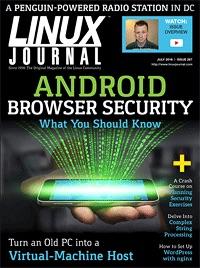July 2016 Issue of Linux Journal


Better Than We Found It
Technology is supposed to make our lives easier. It's supposed to automate those things that take our valuable time, and it promises to make those things we still do faster and more efficient. Unfortunately though, it hasn't given us more free time, it's just allowed us to cram even more activities into our already busy schedules. Thankfully, some technology really does make our lives better. If we're willing to learn and change, technology really can be that invaluable aid in our lives. The trick is to make technology work for us, and not the other way around.
For example, in last month's issue I wrote about the Raspberry Pi IP camera I created in order to live-stream my bird feeder. Since then, I've learned about a new tool called UV4L that makes my Raspberry Pi an even better camera. Learning about new technology and new ways to use existing technology is the secret to getting the most out of our increasingly digital world.
Reuven M. Lerner describes a better way to host WordPress installs using nginx. Building on last month's introduction to nginx, Reuven shows how scalable it can be in a real-world scenario. Dave Taylor follows with a fascinating look at how to automate the creation of content. Using "spinning", Dave shows how to create content that can be used for evil, but is also brilliant in its execution. If you've ever wanted to peer into the mind of a spammer, Dave will introduce you to the robotic version of one.
We can never get "good enough" at security to be fully secure, but with the help of Susan Sons, we can do our best to be security-focused and prepared. Much like a school has fire drills, Susan explains the concept (and plan for realization) of running security exercises. Having a staff that is not only aware, but also practiced at dealing with security can be invaluable. Susan gives us a very practical plan for making that happen.
Charles Fisher provides a depressing, but very important look at Android browser security—or more specifically, the lack of security in the Android WebKit browsers. There are so many programs utilizing the Android WebKit libraries that a vulnerability at that level can have security ramifications far beyond the default stock browser. Charles not only explains the problem, but also gives some concrete information on how to deal with the potential security nightmare still in many Android systems.
Alan Peterson explores a better way to do radio. Linux isn't the default for most radio stations, but in Washington, DC, that's changing. Thanks to the power of open-source software and the flexibility of coding on Linux, several radio stations are finding Linux is the answer for secure, scalable management of radio, especially in this increasingly internet-centric world. If you're interested in how radio stations are automating using Linux as their core, you won't want to miss his article!
Finally, John S. Tonello continues his three-part series on making the internet—or more specifically, on creating a tiny virtualized environment for testing internet tools efficiently and effectively. Using VirtualBox and Proxmox, John demonstrates how easy and powerful a virtualized environment truly can be. If you're tired of doing your simulations on piles of old computers, this is a series you'll really enjoy.
We all know Linux makes the world a better place. Whether you're talking about its presence in the mobile space, its dominance in the cloud or just its efficiency in a server room, Linux is invaluable. In this issue, we explore lots of ways Linux and open source are making our technology more and more beneficial, and along the way, we get to learn cool new things. We hope you enjoy this issue as much as we've enjoyed putting it together!
Available to Subscribers: July 1










